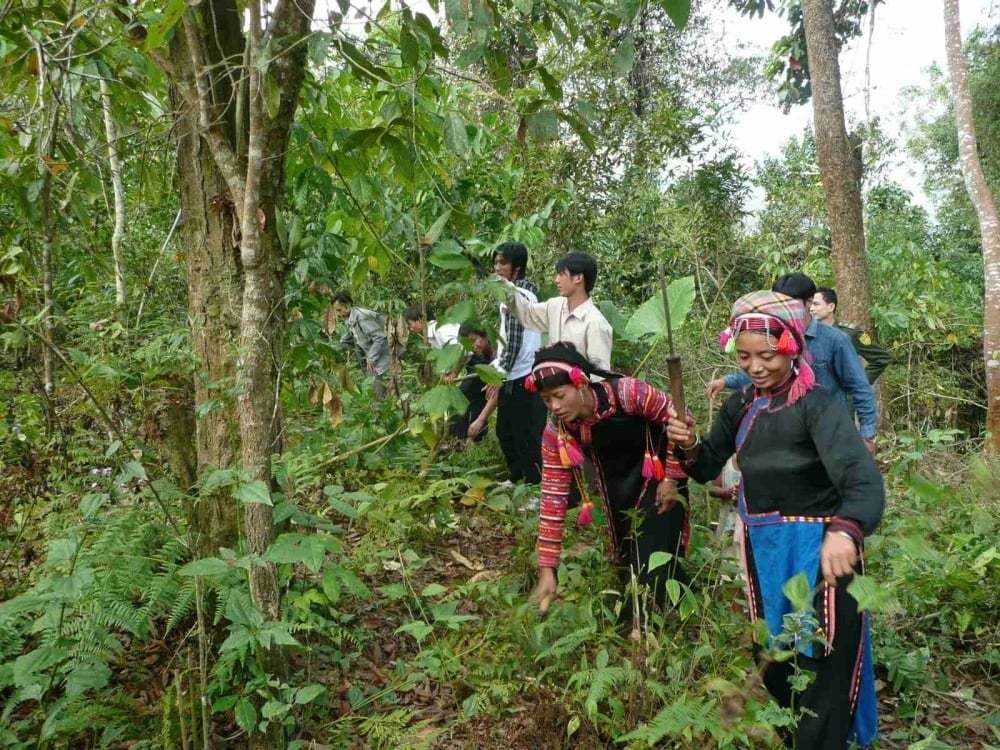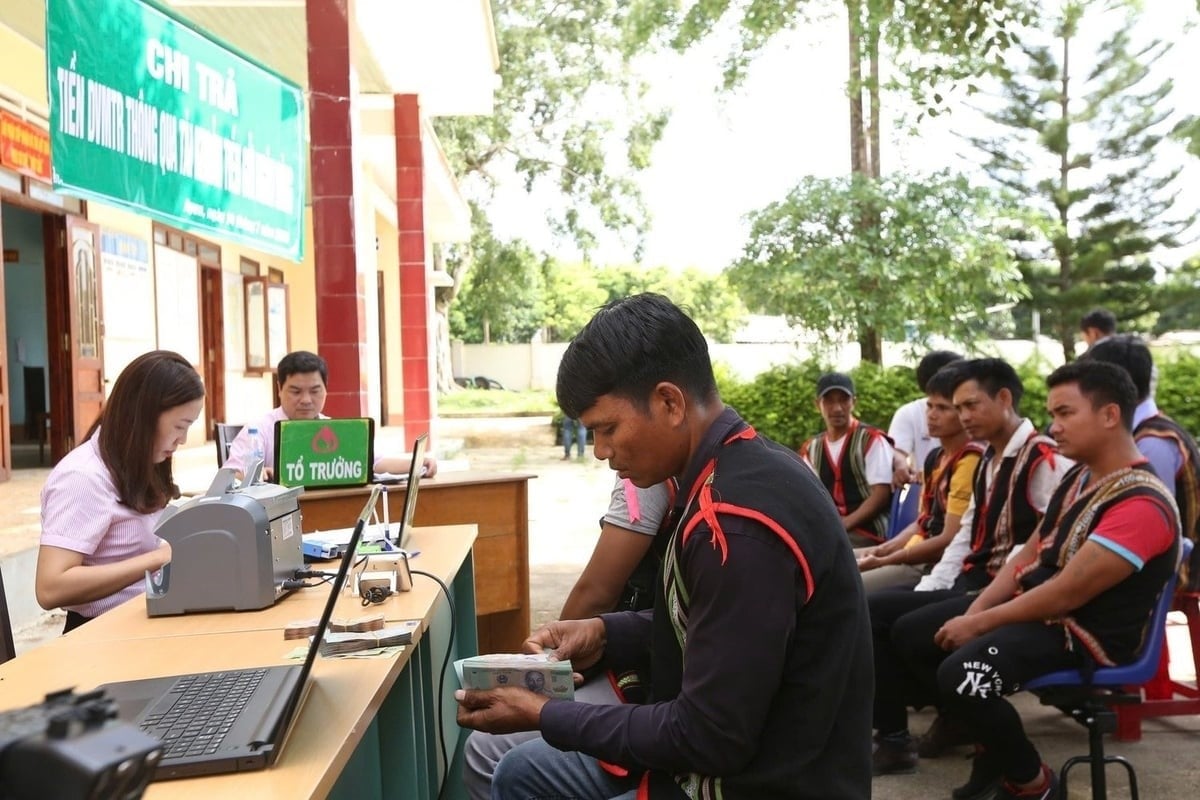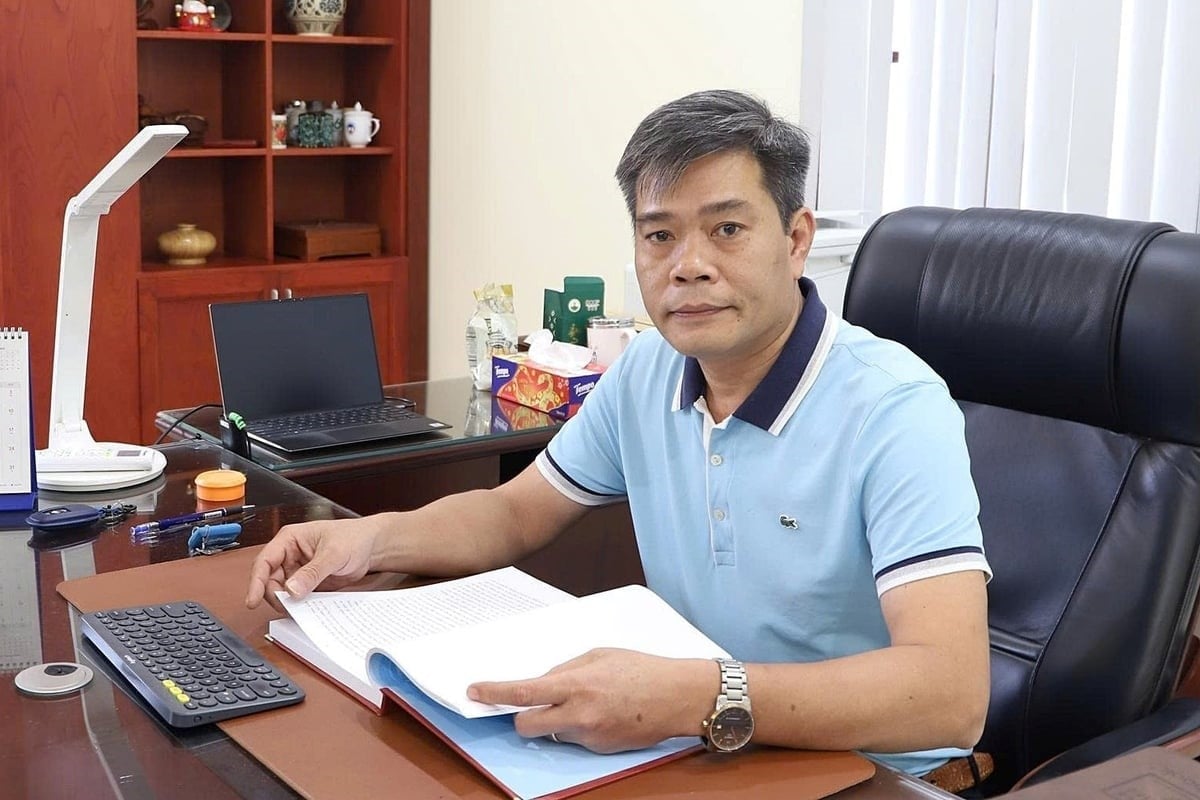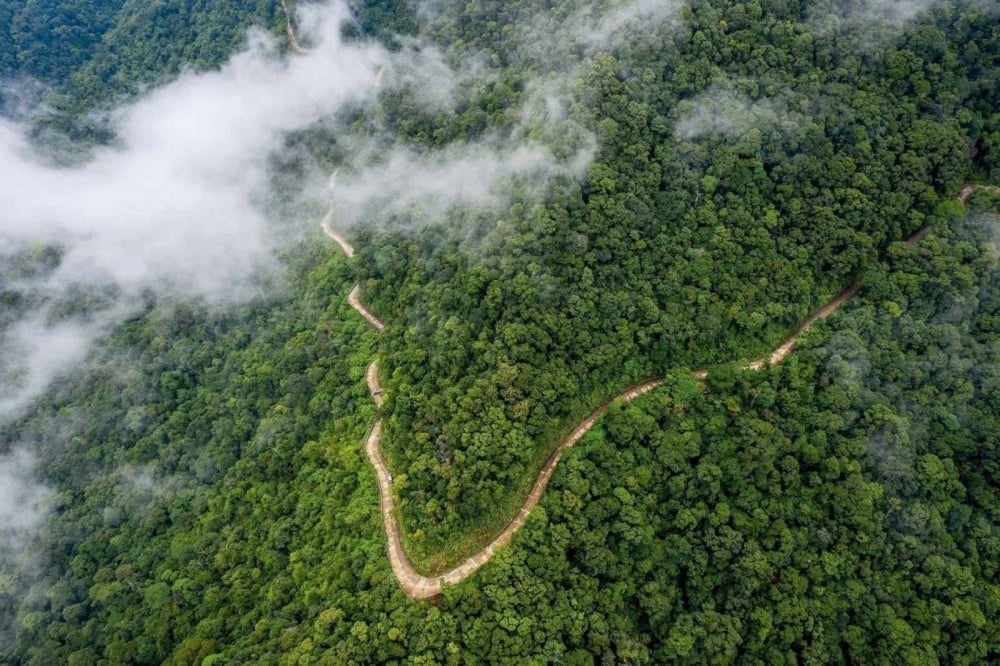November 5, 2025 | 07:33 GMT +7
November 5, 2025 | 07:33 GMT +7
Hotline: 0913.378.918
November 5, 2025 | 07:33 GMT +7
Hotline: 0913.378.918
Forest protection was once seen as a burden for upland communities, as the economic benefits were negligible compared with livelihood needs. However, since the introduction of the Payment for Forest Environmental Services (PFES) policy in 2011, the landscape has changed. Local people now earn direct income from their efforts to safeguard forests, while businesses pay fees for the use of water resources, landscapes, and the environment.
After more than 15 years, this policy has become one of the most highly valued initiatives of Vietnam’s forestry sector at the international level.

Local communities patrol and protect forests. Photo: Lai Chau Forest Protection and Development Fund.
The policy's results are visible in many upland villages, including in Hue City, where village roads have been concreted and community cultural houses renovated with funding drawn from the PFES fund. Beyond earning additional income from forest protection, the people also benefit directly from infrastructure that serves their daily lives.
Hue is among the North Central provinces piloting the transfer of emission reduction results and financial management under the Emission Reductions Payment Agreement (ERPA). This is a step continuing the REDD+ process that Vietnam has pursued for years, aiming to reduce greenhouse gas emissions caused by deforestation and forest degradation while increasing carbon stocks.
According to Mr. Nguyen Tat Tung, Director of the Hue Forest Protection and Development Fund, more than 205,500 hectares of natural forest in the locality have been brought under the ERPA payment mechanism. For the 2023–2025 period, nearly VND 136 billion has been allocated to pay over 600 forest owners, including organizations, community groups, and commune-level governments.
In just the first two years of implementation (2023–2024), over 99% of total payments to beneficiaries were disbursed. Hue City aims to complete disbursement of over 95% of the remaining funds by the end of 2025, ensuring both effectiveness and on-schedule progress.

The people wait to receive forest environmental service payments. Photo: Bao Thang.
The program has also supported livelihoods for nearly 100 communities with total funding of more than VND 5 billion, focusing on practical items, such as building forest protection fences, village entrance gates, sanitation facilities, and solar-powered lighting systems, and providing crop and livestock breeds. This new people-centered approach promotes the role of communities in forest protection while creating momentum for sustainable livelihoods.
After three years of ERPA implementation, Hue has recorded positive movements in forest management and protection. In 2024, the total area of deforested land decreased to just 2.68 hectares with 25 violation cases, which is the lowest level in the 2021–2024 period. Of this, production forests accounted for the largest share of encroachment (over 2.6 hectares), protection forests were only slightly affected (around 0.06 hectares), and no damage was reported in special-use forests.
Encouragingly, the entire area of natural forests under the payment scheme has contributed to strengthening the quality of forest protection and maintaining the city's forest cover at 57.18%.

Assoc. Prof. Dr. Phi Hong Hai, Deputy Director of the Vietnamese Academy of Forest Sciences: "Payments for forest environmental services are deployed based on solid scientific foundations." Photo: Bao Thang.
Hue stands out as one of the bright spots in the 15 years since the nationwide implementation of the PFES program. To date, more than VND 25 trillion has been cumulatively disbursed, providing nearly 500,000 households with regular income and helping thousands of communities maintain welfare works.
Hydropower, clean water, and tourism businesses have become the party responsible for paying for the services they benefit from. With this policy, Vietnam has been assessed as a pioneering country in Southeast Asia in terms of PFES.
According to Assoc. Prof. Dr. Phi Hong Hai, Deputy Director of the Vietnamese Academy of Forest Sciences, the success of PFES lies in its solid scientific foundation, from measurement and calculation of forest area to identifying payment sources and monitoring results.
"People will only protect forests when their benefits are secured. The policy has proven this, which is why it should be expanded to new services such as carbon absorption and storage, landscape values, and indigenous knowledge utilization," Mr. Hai said. In his viewpoint, to sustain effectiveness, the payment policy should be designed with greater flexibility, encouraging communities to reinvest their income into livelihood models linked with sustainable forest management.
Not content with current achievements, Mr. Le Van Thanh, Deputy Director of the Vietnam Forest Protection and Development Fund, assumed that the key task in the next period is to provide advice and finalize the legal framework to promote the development of the forest carbon credit market. The Fund is currently contributing to the draft Decree on forest carbon absorption and storage services, considering it an opportunity to turn ecological potential into economic value.
At the same time, the Fund will accelerate monitoring of payments at the local level to ensure proper targeting, timely implementation, and financial transparency. The communication work will also be prioritized to raise awareness among stakeholders while strengthening connections with international partners to help Vietnam integrate more deeply into the global trend of low emissions and sustainable development.

Revenue from forest environmental services helps communities and local people feel secure in safeguarding forests. Photo: Bao Thang.
From the management perspective, Mr. Pham Hong Luong, Deputy Director General of the Forestry and Forest Protection Department, assessed that PFES is one of the most successful policies of the forestry sector in decades.
"Payments have demonstrated their effectiveness, but to ensure long-term vitality, we must broaden revenue streams while guaranteeing transparency and fairness, thereby building trust among both the people and businesses," Mr. Luong analyzed.
The case of Hue clearly illustrates the policy’s impact, as part of the disbursed funds have been reinvested by communities into public infrastructure. This serves as evidence that forest environmental service payments are gradually becoming a driver of local socio-economic development.
As the nation celebrates the 80th anniversary of its foundation, the 15-year journey of the Payment for Forest Environmental Services (PFES) program, though not long, highlights the determination to innovate the forestry policy. From a pilot mechanism, forest environmental services have gradually become a stable financial source, creating a transformation in forest management and protection while helping to address the long-standing "bottleneck" between economic development and environmental protection.
Translated by Thu Huyen

(VAN) At Dinh My commune (An Giang province), Loc Troi Group recently organized Mini Expo 2025 under the theme ‘From technology to practice – Comprehensive cultivation solutions for crops.’
/2025/11/04/2510-4-162016_246.jpg)
(VAN) The launch of the 'Carbon for Good' project in Lai Chau opens up a new direction in forest management and protection, laying the foundation for developing carbon credits.

(VAN) Hai Phong is implementing a comprehensive greenhouse gas inventory program, promoting sustainable and eco-friendly development.
/2025/11/01/5020-0-nongnghiep-235014.jpg)
(VAN) According to the FAO Representative in Vietnam, innovation for a sustainable food future must stem from fresh ideas of young people who dare to think differently.

(VAN) The adoption of LED lighting technology in fishing operations is expected to help local fishermen cut fuel costs, boost catch efficiency, and progressively modernize their fishing fleets.

(VAN) Out of over 20 chicken farms in Trung Cao hamlet (Phu Nghia commune, Hanoi), only those of Pham Thi Le and Pham Van Thuc still pursue this rare trade.

(VAN) Kim Anh commune (Hanoi) has proactively implemented measures to protect livestock herds, maintaining a “safety shield” for local livelihoods.